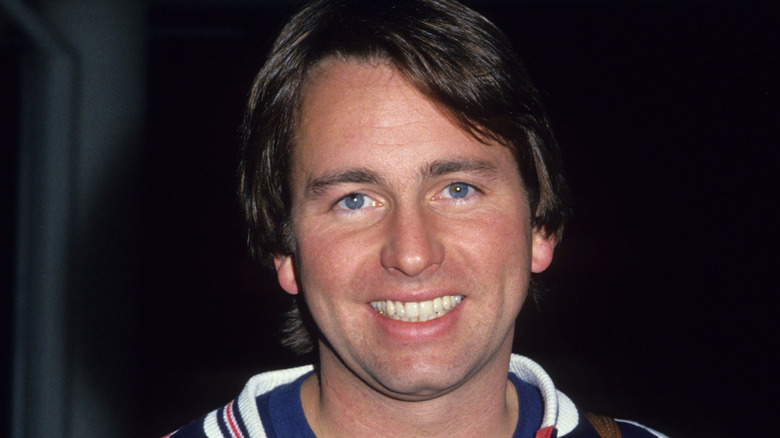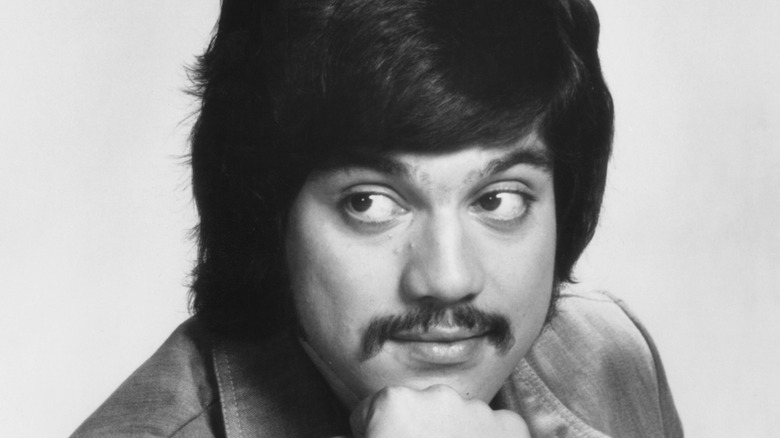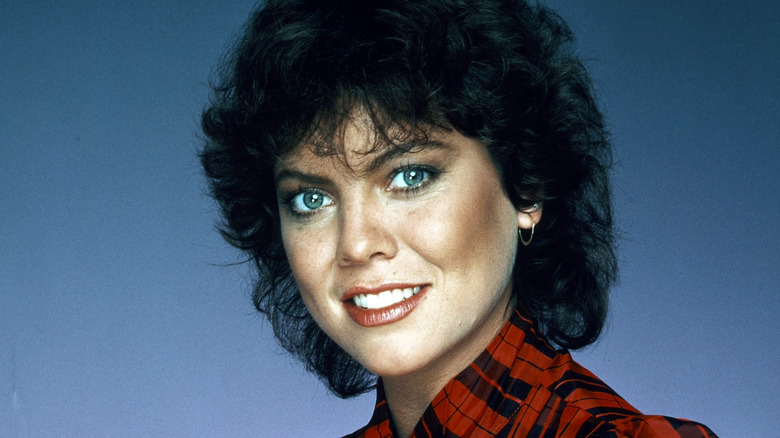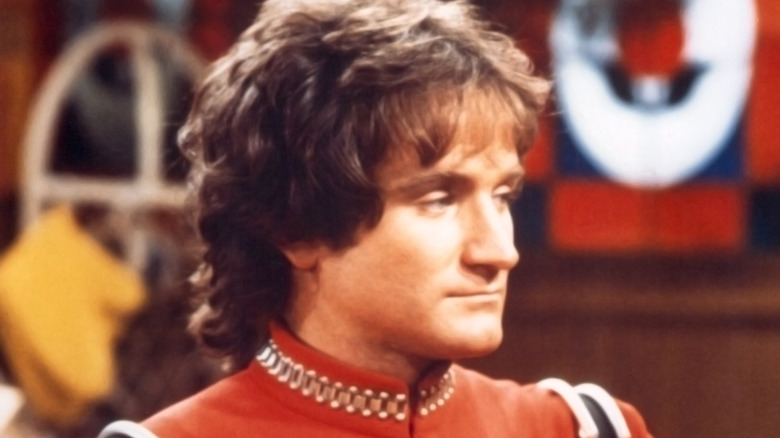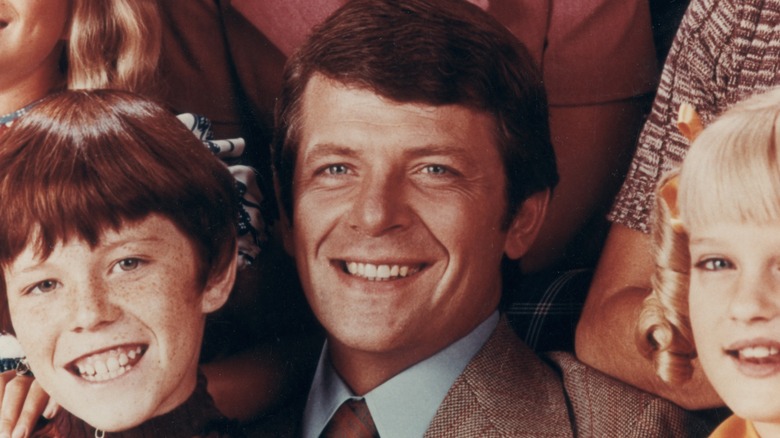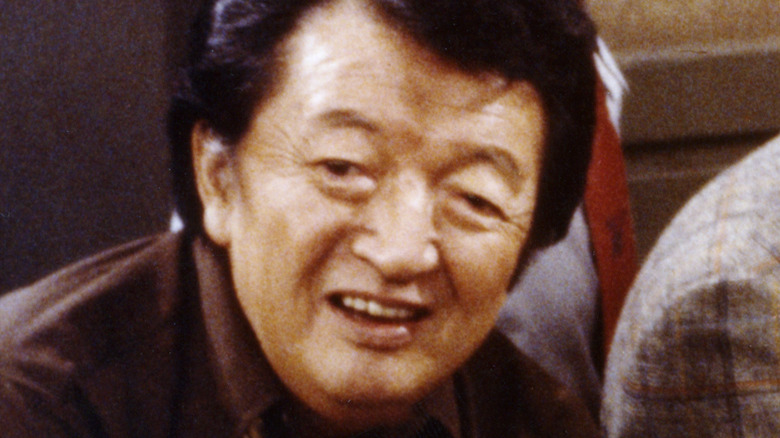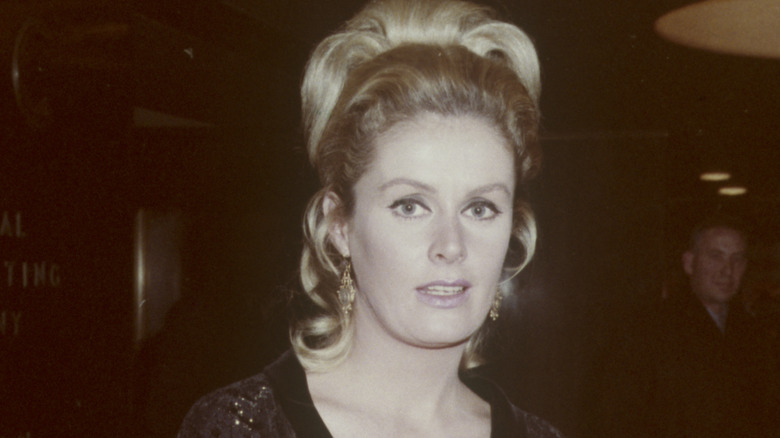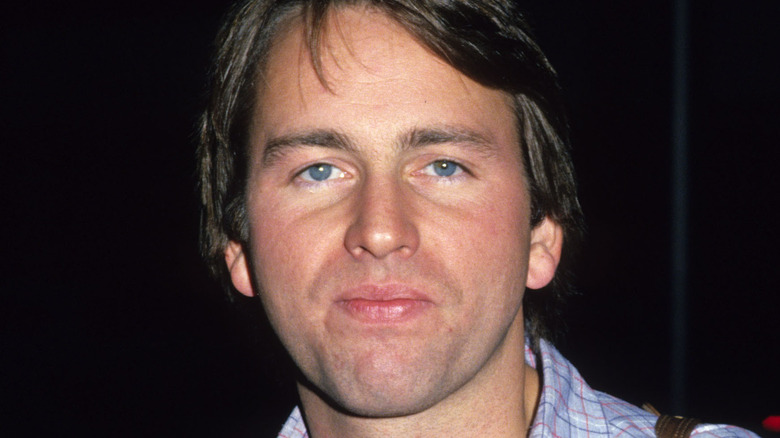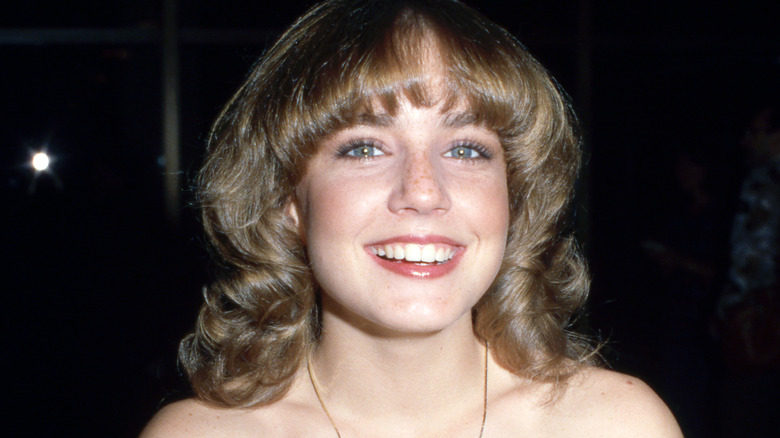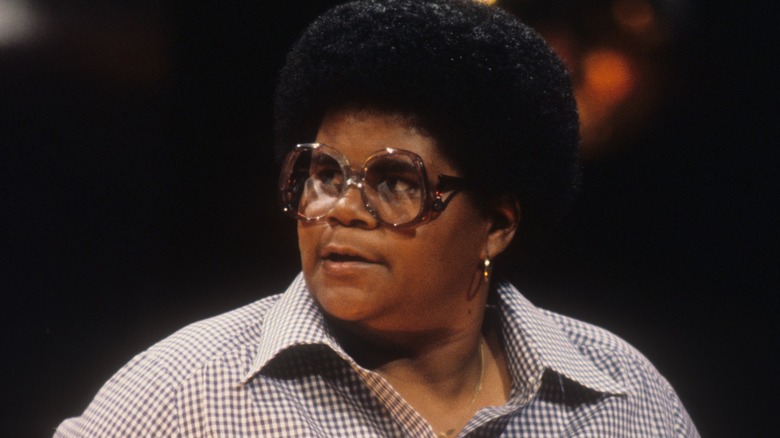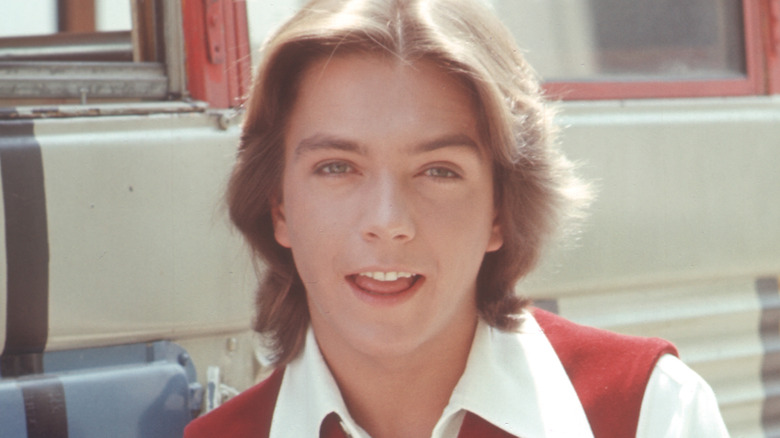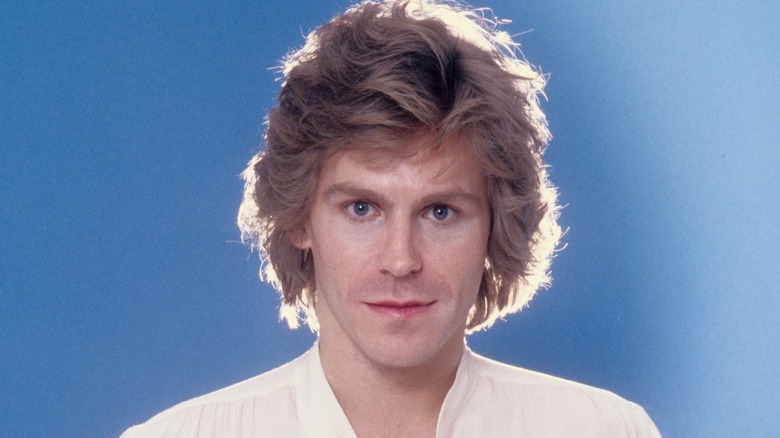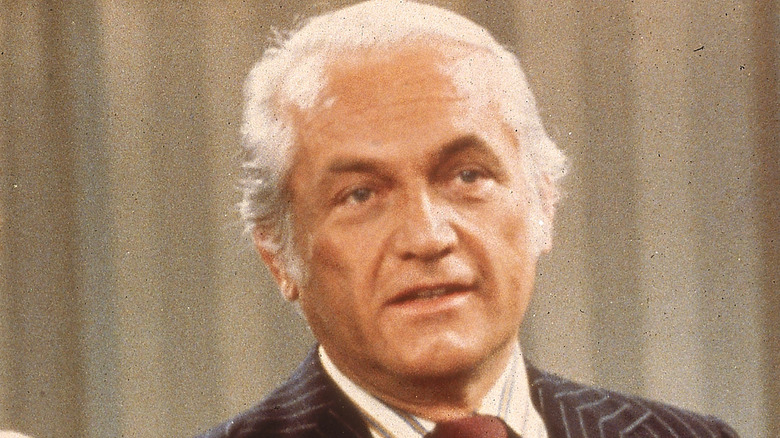The Most Tragic Deaths Of '70s Sitcom Stars
Many sitcoms endlessly rerun, and the older they are, the more they become part of our cultural fabric and background noise. Actors from vintage, nostalgic 1970s sitcoms have seemingly always been around and always will be, over time becoming synonymous with their characters. Sure, it's not really them up on those screens, it's their characters, but it's still a kind of immortality. Almost universally, most episodes of '70s sitcoms ended happily, with a lesson learned and everything made right in its upturned world. Of course, it doesn't always work that way in real life.
Television characters from that time don't often die, but the actors who played them certainly do. Many of the biggest stars from that golden age of television comedy died suddenly, tragically, and without much warning or dignity. Here are all the superstars of the '70s small screen whose deaths came too early and in particularly tragic fashions.
The following article mentions addiction, mental health issues, and death by suicide.
Freddie Prinze
A frenetic, energetic, charismatic stand-up comedian specializing in stories about his Latino identity and New York upbringing, Freddie Prinze was only 19 when he made his television debut on "The Tonight Show Starring Johnny Carson" in December 1973. Less than a year later, he was starring on the NBC sitcom, "Chico and the Man." Creator James Komack had seen Prinze's performance on "The Tonight Show" and championed him for the role of Chico, opposite Jack Albertson as his boss at an East Los Angeles auto shop, after comedy duo Cheech and Chong said no to the series. Powered by Prinze's personality and popularity as one of the hottest comics in the nation at the time, "Chico and the Man" finished its debut season, 1974-75, as the No. 3 show on TV.
During production of the show's third and ultimately final season, Prinze had a mental health break after the end of his marriage and fears over court proceedings surrounding a minor drug crime. In the early morning hours of January 28, 1977, a severely depressed Prinze attempted to die by suicide. Still alive but unresponsive when he was rushed to UCLA Medical Center in Los Angeles and connected to life-sustaining machines, Prinze died when doctors declared brain death. The comic and sitcom star was 22 years old.
Erin Moran
Whatever happened to the cast of "Happy Days"? After more than a decade associated with the '50s-set, '70s-originating sitcom portraying Joanie Cunningham, Erin Moran couldn't find many roles. She guest-starred on "The Love Boat" and "Murder, She Wrote," but then didn't work for 10 years, and popped back up in a few small parts in the '90s and 2000s.
In 2010 and financially struggling, Moran lost her California home to foreclosure, and a few months later, after the actor and her spouse, Steve Fleischman, didn't move out, police were summoned to evict them. The pair moved to Indiana and into a trailer they shared with Fleischman's mother. By 2012, Moran was unhoused again — her in-law forced her out because she partied too often. From then on, Moran lived in a string of motels, her main source of income being a cut of a legal settlement over unpaid merchandise royalties for "Happy Days" actors. In late 2016, Moran was diagnosed with squamous cell carcinoma, an aggressive type of cancer that eliminated the actor's ability to speak within two months. In April 2017, Moran's body was found by Harrison County, Indiana, paramedics responding to an emergency call. The actor was 56.
Robin Williams
Before he was a four-time Academy Award nominee (including a win for "Good Will Hunting") or the headliner of blockbuster comedies like "The Birdcage" and "Mrs. Doubtfire," as well as a voice actor in animated smashes "Happy Feet" and "Aladdin," Robin Williams starred as a wacky extraterrestrial on "Mork and Mindy," a "Happy Days" spinoff. From 1978 to 1982, Williams portrayed Mork, a newly arrived alien from the planet Ork, curious about how the way things worked on Earth. "Mork and Mindy" was a top-five hit in its first season, and the Emmy-nominated Williams was already starring in major films by the time the show ended its run. He'd return to episodic television in 2013, with sitcom "The Crazy Ones," which would turn out to be one of the last projects Williams would make.
In August 2014, Williams was found dead at his home near San Francisco; the actor died by suicide. Publicist Mara Buxbaum told The New York Times that Williams had "been battling severe depression." Three months earlier, the actor had also been diagnosed with Parkinson's disease, a degenerative neurological condition, and while Williams endured memory loss, decreased mobility, and a decline in mental health, he was actually misdiagnosed. An autopsy in October 2014 indicated that Williams had Lewy Body Disease, a condition similar to Parkinson's in which proteins accumulate in the brain and cause destructive symptoms. Williams was 63.
Robert Reed
Once most associated with the 1960s legal series "The Defenders," Robert Reed became a TV legend for playing Mike Brady, the wise father of six in the blended-family '70s staple "The Brady Bunch." Reed's habit of fact-checking scripts led to fights with series creator Sherwood Schwartz, and he sat out the series finale in protest. However, the actor returned to his biggest role in revivals like "The Brady Bunch Variety Hour," "The Brady Girls Get Married," and "A Very Brady Christmas."
Reed kept secret from the public — but not his "Brady Bunch" costars and crew members — that he was gay. "He was an unhappy person. I think had Bob not been forced to live this double life, I think it would have dissipated a lot of that anger and frustration," his TV wife Florence Henderson told ABC News. LGBT-identifying celebrities being open about their sexuality is a relatively recent concept, and Reed couldn't disclose that information in the more conservative '70s. "It probably would have caused the demise of the show," co-star Barry Williams said.
HIV/AIDS first developed in and ravaged the LGBT community in the early 1980s, and it got a lot more attention after celebrities who hadn't publicly identified themselves as gay died from the disease — including Reed. In 1992, the actor died in a Pasadena hospital. The primary cause was colon cancer, but a death certificate indicated that the disease was exacerbated by HIV. Reed was 59 years old.
Jack Soo
By the time he was cast on the '70s ABC police sitcom "Barney Miller" — as sad sack Detective Sergeant Nick Yemana, well-known around the precinct for making hilariously terrible coffee — Jack Soo was an accomplished character actor of stage and screen. He was previously best known for the short-lived '60s sitcom "Valentine's Day" and being part of the ensemble of the Broadway and film versions of the musical "Flower Drum Song," but a major role on the intimate, Emmy-winning top 20-hit "Barney Miller" was a breakthrough for a performer in his late 50s when the show began.
Around 1978, Soo learned that he had cancer of the esophagus. He submitted to a tumor removal surgery and six weeks of follow-up treatment. On "Barney Miller," characters mentioned that Sergeant Yemana was recovering from appendicitis. He returned to the show for part of the 1978-79 season before getting too sick to continue. Soo died in January 1979 at age 63; "Barney Miller" writers opted to have his character die, too.
Diana Hyland
A standout on Broadway from her role in Tennessee Williams' 1959 play "Sweet Bird of Youth," and a cast member of the steamy late '60s primetime soap "Peyton Place," Diana Hyland would appear on dozens of police and medical procedural TV series in the 1970s. Hyland was diagnosed with breast cancer in 1975, and underwent treatments to stop the spread of the disease, including a mastectomy. By the time she started filming the made-for-TV movie "The Boy in the Plastic Bubble" in 1976 — where she met John Travolta, who played her son and with whom she engaged in a high-profile romance — she believed herself to be in good health. Looking toward the future, Hyland won a lead role in the TV comedy "Eight is Enough."
Hyland played Joan Bradford, mother of eight children, but she was only able to tape four episodes before the cancer returned and she became too sick to continue. "She didn't know she was going to die for sure until two weeks before," Travolta told People of Hyland's death on March 27, 1977, at her home in Los Angeles. Hyland was 41 years old. Six months after her death, Hyland won a posthumous supporting actress Emmy Award for "The Boy in the Plastic Bubble."
John Ritter
Recognizable to 1970s TV audiences for his recurring role as a minister on "The Waltons," John Ritter shot to stardom in 1976 with "Three's Company." Racy for the time, and arguably a TV show that seriously crossed the line, Ritter led the cast as pratfall-prone Jack Tripper, who pretends to be gay in order to rent an apartment with two single, often scantily-clad women. "Three's Company" won Ritter an Emmy Award and engendered a lot of goodwill. Ritter was never far from the small screen, and he'd later star in well-received sitcoms like "Hooperman," "Hearts Afire," and in 2002, "8 Simple Rules for Dating My Teenage Daughter." Ritter played Paul Hennessy, a dad riddled with anxiety over his maturing and increasingly willful children.
In September 2003, while filming the fourth episode of the comedy's second season, Ritter complained of problematic nausea, weakness, and chest pain, and he left the set for the emergency room at Burbank's Providence St. Joseph Medical Center. Tests suggested that Ritter was experiencing a heart attack. Before an emergency surgery could begin, doctors diagnosed an aortic dissection, a rip of the inner layer of the heart's aorta, which leads blood to go where it shouldn't and further damage the organ. An X-ray, ordered earlier but not performed, would have detected the aortic dissection; pursuing a different line of treatment when time was of the essence may have saved Ritter's life. Instead, he died in the operating room at age 54.
Dana Plato
Alongside Gary Coleman and Todd Bridges, who lived a life full of tragic details, Dana Plato co-starred as Kimberley Drummond on "Diff'rent Strokes." Plato's life off-screen was consistently beset by drug issues. At the age of 14, right around the time that "Diff'rent Strokes" began in 1978, Plato overdosed on prescription painkillers, and at 15, Plato showed up to work intoxicated. In 1984, 18-year-old Plato became pregnant, leading "Diff'rent Strokes" producers to reduce her part to a recurring role. In 1991, the actor was arrested for robbing a video store and for using falsified prescriptions.
On May 7, 1999, Plato guested on "The Howard Stern Show," attesting to her sobriety but fielding phone calls from listeners who didn't believe her, to the point where Plato offered to take a drug test. "I'm tired of defending my character," Plato said (via the New York Post). "My life is so good now. I've never been happier." The next day, Plato and her fiancé visited the latter's parents in Moore, Oklahoma. Plato retreated to a bedroom for a nap, but after she didn't wake up for several hours, her family found the actor unresponsive. Authorities pronounced Plato dead from a fatal overdose of painkillers and anti-anxiety medications. First believed to be an accidental death, the Oklahoma state Medical Examiner's Office later ruled that Plato died by suicide because of the volume of drugs in her system and because she had a history of suicidal ideation. Plato was 34.
Shirley Hemphill
"What's Happening!!" was a low-key smash for ABC in the late 1970s. A sunny, 1976-1979 sitcom based on the 1975 dramedy film "Cooley High," "What's Happening!!!" was one of the biggest teen shows of the decade, depicting teenagers Raj, Dwayne, and Rerun basing their minor adventures out of a soda fountain called Rob's Place where they butted heads with sharp-tongued server Shirley. As Shirley, Shirley Hemphill was a raw, kinetic, fast-talking comic force, and it was necessary to bring her back for the syndicated mid-1980s revival "What's Happening Now!!" It was therefore unsurprising that she moved on from sitcoms to become a touring nightclub stand-up comic.
On December 10, 1999, gardeners arrived for work at Hemphill's home in West Covina, California. Glancing into a window, one worker spotted what looked like a person lying on the floor of the bedroom. Emergency personnel responded to the scene and discovered that the person in question was, in fact, Hemphill. The actor and comic was pronounced dead at the age of 52. A postmortem investigation revealed the cause of death to be kidney failure.
David Cassidy
David Cassidy played a teen idol and hitmaker on-screen — as family band frontman Keith on "The Partridge Family" — and was one in real life, too. He sang on the No. 1 hit "I Think I Love You" and scored some solo smashes. but after "The Partridge Family. ended in 1974, Cassidy's career faltered. He starred in the short-lived spy show "David Cassidy – Man Undercover," and briefly found success on Broadway in "Joseph and the Amazing Technicolor Dreamcoat" before hitting stages as a nostalgia act singing his early '70s hits.
After Cassidy filed for bankruptcy, he publicly admitted that he was an alcoholic; in 2010, 2013, and 2014, police in Florida, New York, and California, respectively, arrested Cassidy on drunk driving-related charges. The third incident carried with it a court-ordered rehab program, which Cassidy said helped him find lasting sobriety. When he nearly tumbled off the stage at a 2017 concert, Cassidy said he was suffering from dementia, but later that year told a documentary producer that alcohol was to blame, and that he'd never actually gotten sober. "I lied about my drinking," Cassidy said (via The Washington Post). "I did this to myself to cover up the sadness and the emptiness." Just after his admission, Cassidy died in November 2017 of liver and kidney failure.
Jeff Conaway
Jeff Conaway nabbed two Golden Globe nominations for playing aspiring actor and cabbie Bobby Wheeler on "Taxi," but he left the show a few seasons into its run in 1982, claiming creative boredom. "Bobby was written into an empty hole. There was nowhere to go," he told The Daily News Leader in 1983. In 2008, "Taxi" writer Sam Simon revealed on "The Howard Stern Show" that Conaway had actually been fired. Unreliable due to substance abuse issues, producers let the actor go after he was discovered in his dressing room too intoxicated to tape that day's episode.
Conaway's first big post-"Taxi" projects: the swiftly canceled series "Wizards and Warriors" and "Berrenger's." By the 2000s, most of Conaway's appearances came on celebrity-based reality shows like "Celebrity Fit Club," which he departed after three episodes for drug rehab following an on-air meltdown, a disturbing thing that happened on a reality show. A January 2010 fall down a flight of stairs left Conaway with a brain hemorrhage and broken bones in his arm, hip, and neck. Three months of hospitalization led to a relapse in his use of prescription painkillers, which he'd become dependent on years earlier after an unrelated medical incident. Conaway never emerged from the relapse — in May 2011, the 60-year-old actor died of a prescription drug overdose.
Ted Knight
A standout on "The Mary Tyler Moore Show" — a comedy about the goings on in a Minneapolis TV newsroom – Ted Knight won two Emmy Awards for his role as arrogant, ignorant anchor Ted Baxter. Knight was in high demand for his comedy skills after "The Mary Tyler Moore Show" ended in 1977. "The Ted Knight Show" hit screens in 1978 and lasted just six episodes, but he rebounded in 1980 with a role as villainous Judge Smalls in the golf comedy film "Caddyshack" and another sitcom. On "Too Close for Comfort," Knight portrayed Henry Rush, a cartoonist who works at home amidst the chaos brought by his two adult daughters.
ABC canceled the fading show in 1983, but TV conglomerate Metromedia ordered new episodes to air on the many individual stations it owned. Two years into the venture, Metromedia retooled "Too Close for Comfort," adding and subtracting characters, changing the setting, and renaming it "The Ted Knight Show" so as to better focus on the star. After taping and airing 22 episodes of the new "The Ted Knight Show," Knight died in August 1986 at the age of 62; since the previous year, he'd been quietly treated for colon cancer. The series was quickly canceled.
If you or anyone you know needs help with addiction issues, needs help with mental health, or is struggling or in crisis, contact the relevant resources below:
-
The Substance Abuse and Mental Health Services Administration website or contact SAMHSA's National Helpline at 1-800-662-HELP (4357).
-
The Crisis Text Line by texting HOME to 741741, call the National Alliance on Mental Illness helpline at 1-800-950-NAMI (6264), or visit the National Institute of Mental Health website.
-
Call or text 988 or chat 988lifeline.org
